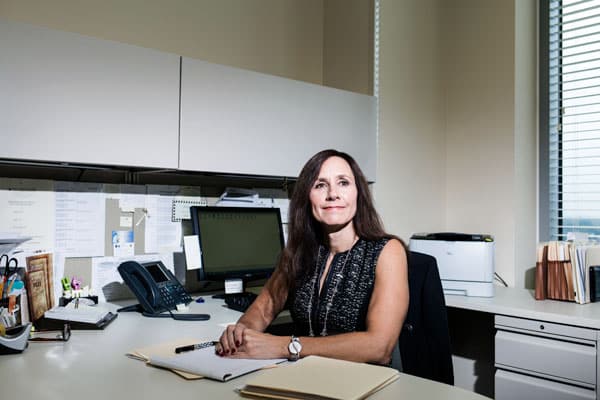Never stop learning. Pay it forward. Hold your ground. Be comfortable in your own skin. These are just a few of the theories that Gina Knox puts into practice each day as the general counsel (GC) for Little Company of Mary Hospital in Chicago.
For both herself and her team, Knox promotes the importance of continuous education and learning. In fact, she completes the continuing legal education (CLE) credits required for attorneys every other year—and in the off years, she completes the credits needed to keep her nursing license active as well. Although she hasn’t worked as a nurse since completing law school in 1991, Knox believes that her ability to stay up to date on nursing practices and training helps her communicate with the medical staff at the hospital.
Plus, her ingrained familiarity with medical terminology, abbreviations, and lingo allows her to be an especially effective GC. “When I’m reviewing medical issues that happen on a daily basis, I can access those medical records, ask the right questions: Were the right people consulted? What was the outcome? Is it foreseeable?” Knox says. “I’m grateful that I worked as a nurse. I understand the demands, the caseload, the medications, and the difficulty in documenting. I know the reality versus just the theory, and I think that’s really important.”
Knox takes that same approach to mentoring and promoting experience- and knowledge-sharing among colleagues. She firmly believes in a pay-it-forward model for not only helping younger, less-experienced professionals, but also for building a network she herself can rely on when she runs into complicated legal issues.

“Paying it forward is not just the theory of putting the energy out there; it’s actually walking the walk,” Knox says. “I had a call with a less experienced insurance attorney last year. She did not understand certain aspects of insurance jargon. I tried to help her. I told her, ‘When you deal with somebody, try to pay it forward. Take the time to explain it.’”
When Knox graduated from law school, she felt that the culture surrounding lawyers encouraged everyone to keep their knowledge and expertise closely held, rather than openly shared. Attorneys—especially female attorneys, who were in the vast minority at the time—felt pitted against one another, she says. Today, Knox tries to actively dispel that feeling by encouraging young women to see each other as resources rather than competition.
When she needs advice or a different perspective, Knox turns to her own circle of fellow attorneys; most of them are women who have supported one another for years. Knox acknowledges that women can face particular challenges in the legal profession, especially in courtroom settings where they are most seriously outnumbered by male colleagues. According to the American Bar Association, female attorneys made up 35 percent of active attorneys in the United States in 2017—only a 5 percent increase since 2007.
Knox knows firsthand that feeling outnumbered as a woman can be intimidating. That’s one of the reasons she mentors young women even as they’re considering a career in law. “I tell my kids all the time, ‘If you take the mystery out of life, it’s not that scary,’” Knox says. “Everybody has their first day as an attorney or their first day in law school. It’s scary to walk into court for the first time. It’s as silly as reminding yourself, ‘You know what, the judge goes to the grocery store. We’re just people.’”
Knox also makes sure to pass on the kinds of practical advice she wishes she had heard when she was just starting out, like the value of taking an LSAT prep course or how to approach law school applications to make yours stand out. She advises young people to use as many networking avenues, both online and in person, as possible. Continuing to learn and be open to new experiences will also open up career opportunities, she says.
For women especially, Knox also advises to focus on standing firm, especially in negotiations, whether they’re trying to settle a claim/lawsuit or contract terms, without taking things too personally.
“If you’re negotiating, you have to be educated in what you’re negotiating and take a stand. Being firm and taking a stand are not mutually exclusive with being a nice person or professional,” Knox says. “I think that is a very hard concept for younger people, particularly women, to understand. I think that comes with time, you have to be comfortable in your own skin. You have to be educated in what you’re negotiating or discussing.”
With all that said, one piece of wisdom that Knox would pass on to her younger self would be not to worry too much.
“That does not mean that you don’t run after what is important to you,” she says. “You need to look for opportunities, but don’t worry so much because if you have those basic components, and you continue to nurture those—being hardworking, having foresight, being open—things will fall into place.”
Photo by Guerrero


